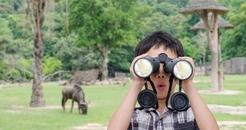 The value of real-world learning experiences
The value of real-world learning experiences
From an article by Ohio State University
Real-world learning experiences, like summer camps, can significantly improve children’s knowledge in a matter of just days, a new study suggests. Researchers found that 4- to 9-year-old kids on a zoo summer camp boosted a key component of learning in just days - they knew significantly more about how animals are classified after just a four-day camp at a zoo.
It wasn’t that children who attended just knew more facts about animals, the researchers noted. The camp actually improved how they organized what they knew – a key component of learning.
“This suggests organization of knowledge doesn’t require years to happen. It can occur with a short, naturalistic learning experience,” said Layla Unger, lead author of the study and a postdoctoral researcher in psychology at The Ohio State University. “It highlights the enriching potential of real-world programs like summer camps. They aren’t just recreation.”.
This study is one of the first to show how quickly knowledge organization changes can occur in children. “We didn’t know if it would take months or years for children to accomplish this. Now we have evidence that it can happen in days,” Unger said.
The study involved 28 children who took part in a zoo camp and were compared to 32 children who participated in a different summer camp which was not at the zoo and didn’t involve animals. At the beginning and end of each camp, all children completed two different tests that measured how well they understood the differences between mammals, birds and reptiles.
At the beginning of the camps, children in both groups had equivalent knowledge about the relationships between the three types of animals. But the children in the zoo camp knew significantly more by the end of their four-day camp, while the others did not.
Unger noted that both camps in the study charged parents for their children to attend and attracted mostly kids from middle-class families and above. That could be an issue for families who can’t afford to send their children to camps. “Our study showed that the zoo camp really did enrich the children who attended. It may help explain at least a part of the learning opportunity gap between children who have access to camps like this and those who don’t.”
Read the full article here.
As well as raising thoughts on how the curriculum could be changed in schools, this may show the value of church summer weeks, short-term mission trips and also the possibility of some children in the community from low income families missing out on positive life experiences.
Retweet about this article:
From an article by Ohio State University, 02/01/2019